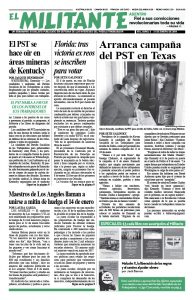For the last two years, the Chinese rulers have systematically organized the indefinite detention of over a million Uighurs, a Turkic-speaking Muslim ethnic minority who live mainly in Xinjiang, a huge region of northwest China bordering Central Asia, in what authorities call “vocational training centers.”
Now the government has begun imposing of a system of forced labor in a growing number of these camps. Surrounded by high barbed-wire fences and guard towers, some detention facilities include factories where Uighurs are compelled to toil at low-or no pay.
For centuries the Uighurs have lived in villages around oases in the lower slopes and valleys of this mountainous desert region, mainly as farmers relying on small-scale agriculture. Today they number some 12 million, many living in dire poverty.
The Uighurs have faced discrimination and cultural and religious persecution for decades. Beginning in early 2017, speaking Uighur or saying Muslim prayers became grounds for internment. For “re-education,” Uighurs are forced to undergo indoctrination sessions, sing hymns praising the Chinese Communist Party and write essays of self-criticism.
Learning Mandarin is mandatory. Men are often forced to shave their beards, women are prevented from wearing veils. And all are forbidden to fast during Ramadan. Solitary confinement, beatings and torture are not uncommon for those who buck the military-style discipline.
After they “graduate” from the indoctrination centers, the detainees are sent to what many Uighurs call “black factories,” known for their harsh conditions. They effectively perform prison labor in small-scale manufacturing for capitalist bosses making textiles, clothes, shoes, carpets and other commodities.
This social engineering began as concentration camps alongside aggressive security sweeps and arrests of Uighur “separatists” after some violent incidents.
Beijing has fostered large-scale immigration into the region of Han Chinese, the dominant ethnic group in the country, who now make up 40 percent of the population. This has added to Uighur complaints of discrimination and marginalization by Chinese authorities.

